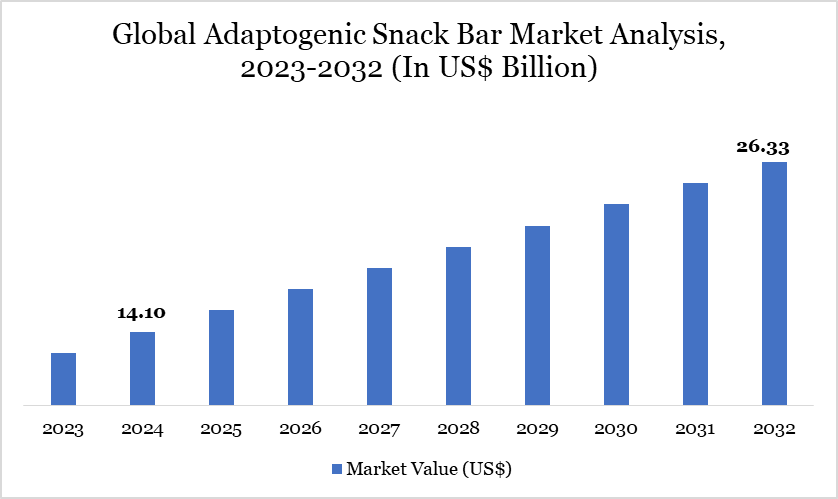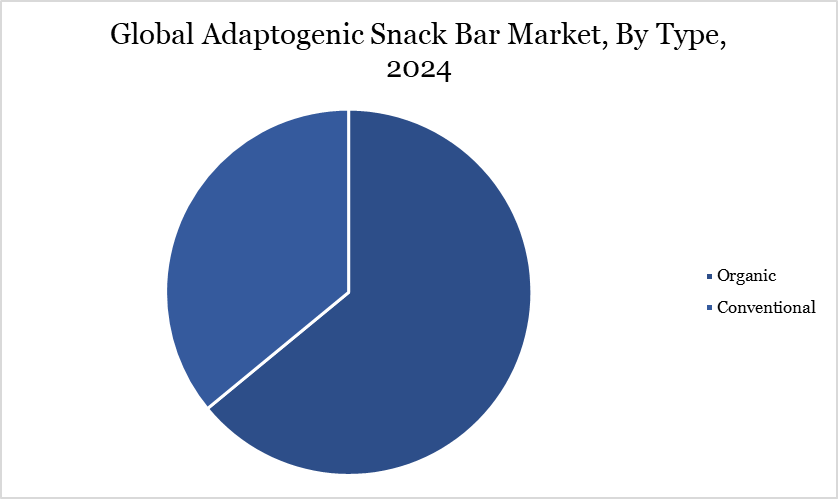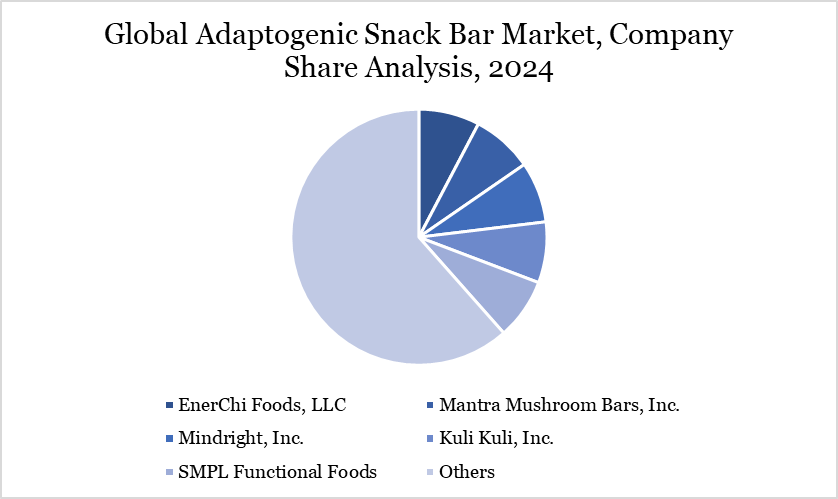Adaptogenic Snack Bar Market Size
Adaptogenic Snack Bar Market size reached US$ 14.10 billion in 2024 and is expected to reach US$ 26.33 billion by 2032, growing with a CAGR of 8.12% during the forecast period 2025-2032.
The adaptogenic snack bar market is experiencing significant growth, driven by increasing consumer demand for functional foods that promote health and wellness. According to the US Department of Agriculture (USDA), organic food sales in the US reached over US$ 60 billion in 2023, reflecting a growing preference for organic and health-focused products.
The trend aligns with the rising popularity of adaptogenic ingredients, such as ashwagandha and reishi mushrooms, known for their stress-relieving properties. The USDA's National Organic Program ensures that products labeled as organic meet strict standards, further bolstering consumer confidence in these offerings.
Adaptogenic Snack Bar Market Trend
A notable trend in the adaptogenic snack bar market is the emphasis on organic certification and clean labeling. The USDA's Strengthening Organic Enforcement (SOE) rule, effective from March 2023, enhances oversight of organic products, ensuring integrity in the supply chain. This regulatory measure supports the growth of organic adaptogenic snacks that align with consumer expectations for natural, non-GMO ingredients offering stress-relief and wellness benefits.
Additionally, the USDA reports that organic fruits and vegetables are the largest organic retail sales food category, surpassing US$ 22 billion in 2022, indicating a strong market for plant-based ingredients commonly found in adaptogenic products.

For more details on this report – Request for Sample
Market Scope
| Metrics | Details |
| By Type | Organic Adaptogenic Snack Bars, Conventional Adaptogenic Snack Bars |
| By Ingredient | Herbal-based Adaptogens, Mushroom-based Adaptogens, Roots and Botanicals, Blend of Multiple Adaptogens |
| By Packaging | Single-serve Packaging, Multi-Serve Packaging, Eco-Friendly Packaging |
| By Distribution Channel | Supermarkets/Hypermarkets, Specialty Stores, Convenience Stores, Others |
| By Price Range | Premium, Mid-range, Economy |
| By Functionality | Stress-relief Adaptogenic Bars, Energy-Boosting Bars, Immunity-Boosting Bars, Focus/Brain-Health Bars, Others |
| By Region | North America, South America, Europe, Asia-Pacific and Middle East and Africa |
| Report Insights Covered | Competitive Landscape Analysis, Company Profile Analysis, Market Size, Share, Growth |
Adaptogenic Snack Bar Market Dynamics
Rising Demand for Favorable Functional Snacking
The introduction of new products in a variety of innovative flavors caters to evolving consumer preferences and leverages the increasing demand for functional snacks that offer health benefits. By incorporating adaptogens like ashwagandha, holy basil and reishi, these products appeal to health-conscious consumers seeking stress relief and mood-enhancing benefits in convenient snack forms. To meet the growing demand for functional snacks manufacturers are introducing new flavorful snack products.
For instance, in December 2022, Tattooed Chef, a plant-based prepared food company, expanded its product line with on-the-go adaptogenic snack bars. Available in four unique flavors such as oat butter graham, oat butter chocolate chip, oat butter peanut and oat butter brownie, each bar is infused with 140 milligrams of adaptogens like ashwagandha, holy basil and reishi to promote various mood-boosting effects, catering to the growing trend of functional snacking.
High Cost of the Adaptogenic Snack Bars Compared to Traditional Snacks
The high cost of adaptogenic ingredients like ashwagandha, reishi mushrooms and holy basil poses a significant restraint for the global snack bar market. These premium ingredients are more expensive than traditional snack bar components, leading to higher production costs and, consequently, higher retail prices. This makes adaptogenic snack bars less accessible to price-sensitive consumers, particularly in emerging markets or during economic downturns.
Additionally, the cost of these ingredients can fluctuate due to factors like crop yields, climate change and shifting demand, further compounding pricing challenges for manufacturers. These elevated costs often limit the profitability of adaptogenic snack bars, particularly for smaller brands without the buying power to secure bulk discounts. The higher price points can also hinder consumer adoption, as many may view these products as luxury items rather than affordable everyday snacks.
Adaptogenic Snack Bar Market Segment Analysis
The global adaptogenic snack bar market is segmented based on type, ingredient, packaging, distribution channel, price range, functionality and region.

Organic Segment Driving Adaptogenic Snack Bar Market
The organic segment is a major force driving the adaptogenic snack bar market, supported by rising demand for clean-label and health-oriented products. According to the US Department of Agriculture (USDA), organic food sales in the US reached US$ 56.4 billion in 2020, indicating growing consumer preference for organically certified products.
The USDA’s implementation of the Strengthening Organic Enforcement (SOE) rule in March 2023 ensures greater transparency and traceability in organic supply chains. This regulatory environment supports the growth of organic adaptogenic snacks that align with consumer expectations for natural, non-GMO ingredients offering stress-relief and wellness benefits.
Adaptogenic Snack Bar Market Geographical Share
Demand for Adaptogenic Snack Bar in North America
The demand for adaptogenic snack bars in North America is rising steadily, fueled by consumer interest in functional foods that promote mental well-being and stress reduction. According to the US Department of Agriculture (USDA), over 50% of adults in the US are actively seeking healthier snack options as part of their daily diets, with a growing focus on plant-based and nutrient-dense foods.
The US Food and Drug Administration (FDA) also supports clear labeling of dietary components such as ashwagandha, ginseng, and reishi in food products, encouraging transparency and consumer trust. This regulatory backing, combined with shifting lifestyle preferences, is driving growth in adaptogenic snack products across retail and wellness channels.
Sustainability Analysis
The sustainability of the adaptogenic snack bar market is shaped by regulatory frameworks and consumer demand for health-conscious products. The US Department of Agriculture (USDA) emphasizes sustainable agricultural productivity growth as essential for meeting current and future food needs while conserving natural resources. The US Food and Drug Administration (FDA) regulates dietary supplements, including adaptogenic products, under the Dietary Supplement Health and Education Act of 1994 (DSHEA), which mandates that manufacturers ensure the safety and labeling of their products before marketing.
Additionally, the FDA enforces labeling requirements to provide consumers with essential information regarding product identification, nutritional facts, and ingredients. These regulatory measures, combined with the USDA's commitment to sustainability, influence the production and marketing of adaptogenic snack bars, encouraging practices that align with environmental conservation and consumer health priorities.
Adaptogenic Snack Bar Market Major Players
The major global players in the market include EnerChi Foods, LLC; Mantra Mushroom Bars, Inc.; Mindright, Inc.; Kuli Kuli, Inc.; SMPL Functional Foods; Wise Bar, Inc.; Four Sigmatic, Inc.; Laird Superfood, Inc.; Rebbl, Inc.; and Adoptogen Health LLC.

Key Developments
In April 2024, TRIP, the UK's largest private soft drinks company specializing in mindfulness and wellness, developed a new range of proprietary functional blends. These innovative drinks feature mushrooms and adaptogens, offered in four refreshing flavors, designed to support mental well-being and stress relief.
In August 2024, think! has partnered with Jessie James Decker to launch think!MINIS Protein Snack Bars. Available in seven flavors, these convenient, bite-sized bars offer the perfect balance of macros for on-the-go snacking.
Why Choose DataM?
Data-Driven Insights: Dive into detailed analyses with granular insights such as pricing, market shares and value chain evaluations, enriched by interviews with industry leaders and disruptors.
Post-Purchase Support and Expert Analyst Consultations: As a valued client, gain direct access to our expert analysts for personalized advice and strategic guidance, tailored to your specific needs and challenges.
White Papers and Case Studies: Benefit quarterly from our in-depth studies related to your purchased titles, tailored to refine your operational and marketing strategies for maximum impact.
Annual Updates on Purchased Reports: As an existing customer, enjoy the privilege of annual updates to your reports, ensuring you stay abreast of the latest market insights and technological advancements. Terms and conditions apply.
Specialized Focus on Emerging Markets: DataM differentiates itself by delivering in-depth, specialized insights specifically for emerging markets, rather than offering generalized geographic overviews. This approach equips our clients with a nuanced understanding and actionable intelligence that are essential for navigating and succeeding in high-growth regions.
Value of DataM Reports: Our reports offer specialized insights tailored to the latest trends and specific business inquiries. This personalized approach provides a deeper, strategic perspective, ensuring you receive the precise information necessary to make informed decisions. These insights complement and go beyond what is typically available in generic databases.
Target Audience 2024
Manufacturers/ Buyers
Industry Investors/Investment Bankers
Research Professionals
Emerging Companies